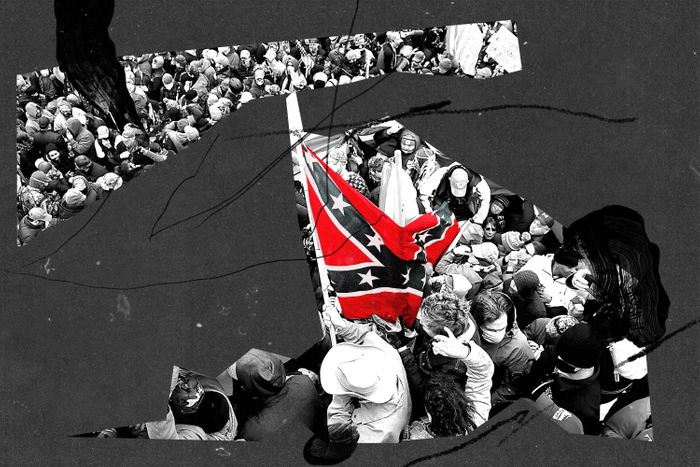
The thought experiment that comes to mind about the riot that took place on January 6, 2021, actually requires little thought to play out: What if the mob of people who attacked the Capitol and threatened the lives of lawmakers had been Black? This question is only difficult to answer if you are under some delusion of equality, some imagined American utopia in which Blackness itself is not seen as an inherent threat to the Republic. But if you live in the United States of America, if you saw the police response to the masses gathered in the streets to protest the ongoing killing of Black people at the hands of law enforcement — even when those protesters were peaceful — then the answer to that question is not only clear but horrifying.
Here’s a related thought experiment: What if the people writing the history of January 6 were Black?
Even though they effectively control both houses of Congress, Democrats with the power to at least investigate this event and mark it in the official historical record have only reluctantly taken up the cause. A 9/11-style bipartisan commission was nixed owing to Republican pressure, while efforts to form a select committee in the House have been beset by partisan fighting over who should be on it. Marjorie Taylor Greene, the QAnon-curious gadfly who rode into office on the wave of white-supremacist rage that fueled the insurrection, is vying for a seat. Ditto Matt Gaetz, a Trump acolyte reportedly under investigation for sex trafficking, and Lauren Boebert, who has been accused of inciting the riot by tweeting “Today is 1776” hours before it occurred.
It would hardly be the first time that reactionaries have managed to whitewash the recent history of this country. The narrative written and repeated about the 2000 presidential race, for example, has largely centered on hanging chads and the Supreme Court. But the election also featured the “Brooks Brothers riot,” wherein a mob of white men in business attire violently shut down a recount attempt in Miami-Dade County, Florida, to ensure a victory for George W. Bush. It might surprise people, even well-meaning people who have no sympathy for Donald Trump’s followers, to learn that the events of January 6, widely held to be “unprecedented,” did in fact have a clear precedent.
When we decline to fold the January 6 insurrection into the predominant narrative of white supremacy in this country — whether it is conservatives’ denying the riot’s significance outright or liberals’ maintaining that these eruptions of mass rage are “not who we are” — we are in danger of forgetting its significance. Aside from a very brief window in which the attack on the Capitol was nearly universally condemned by lawmakers, Republicans have downplayed it, while the 24-hour news cycle has been more than content to move on to battles over critical race theory (a subject that, were it taken seriously, would help us to understand what led to the riot). “There were people who went from being brave defenders of the House door to revisionists, asserting that the whole thing was a ‘tourist group,’” Representative Jamie Raskin of Maryland recently told Politico. “And that did happen in record time.”
If we let the mob participants and sympathizers claim their own version of the narrative, it will be told through a righteous lens, one in which they were defenders of a democracy under threat from radical forces within their country. They will tell stories of their martyrs and someday build statues in their honor. They will cast themselves as patriots who did all they could to preserve the American way of life. They will pass these stories down for generations, and their great-great-grandchildren will take up the fight of their ancestors once again.
They will forge on with a new Lost Cause, while a new generation of Black citizens will bear the weight of witnessing. We will be where we have always been. And our version of history will one day be presented as counternarrative.
As the recurring fights over “The 1619 Project” show us, the work of recasting American history, moving away from the feel-good story that has been taught to schoolchildren for ages, is always met with resistance. The work of honest accounting never takes place in the present — it is deemed too inconvenient, too divisive — which is unfortunate, because if you take too long, you become beholden to the narrative written by those invested in the perpetuation of their own power. To unravel all that is to ask the powerful to remake their own psyche, to find new sources of their self-worth, and to relinquish their hold over institutions that preserve their status. It is the work of revolution.
Joe Biden and the Democratic Party have no stomach for revolution, but even so they must recognize that a half-hearted effort to investigate the January 6 insurrection will invite repetition. The progression from the Brooks Brothers riot to now shows that the violence and extremism will escalate. And what then? What will they say in the face of a new mob, a new riot, a heavily armed militia, a successful attempt to thwart a fairly contested and counted election? It will require something more confrontational than promises to reach across the aisle. They may not have asked to fight this battle over history, but it is not one they can run from.





























